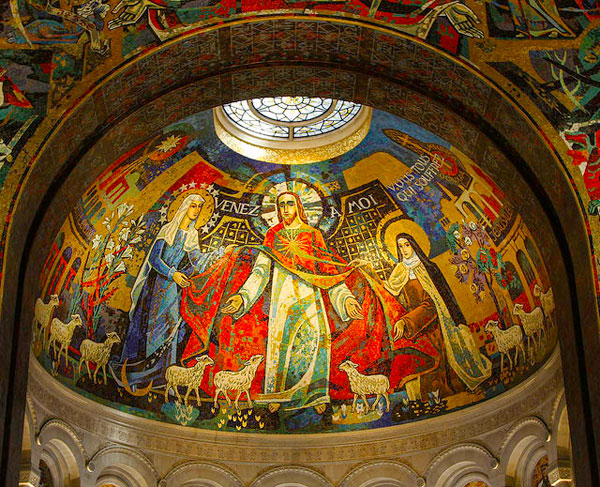Rend your heart and not your garments. (Joel 2:13)
“Rend your heart,” says Joel, “not your garments.” Rending, or tearing open, the garment was a way to demonstrate grief or repentance. In practice, it would be either a true sign of an inward disposition or, as it often was, merely an outward display, an empty show — and God had had enough of that from his people. In Isaiah, the Lord voiced his complaint: “These people come near to me with their mouth and honor me with their lips, but their hearts are far from me. Their worship of me is based on merely human rules they have been taught” (Isaiah 29:13). This was a chronic condition with them, and once again, in Joel, it was time for a change in their inward disposition — a true repentance.
By the time of Christ, the Pharisees had perfected their sanctimony. The Lord Jesus spoke out against this in the Sermon on the Mount, particularly in regard to the practice of charity, prayer and fasting:
Be careful not to practice your righteousness in front of others to be seen by them. If you do, you will have no reward from your Father in heaven. So when you give to the needy, do not announce it with trumpets, as the hypocrites do in the synagogues and on the streets, to be honored by others. Truly I tell you, they have received their reward in full. But when you give to the needy, do not let your left hand know what your right hand is doing, so that your giving may be in secret. Then your Father, who sees what is done in secret, will reward you.Alms, prayer and fasting are all very good things, but the Pharisees had become something of a play-actors guild with them. Jesus called them hypocrites, from the Greek word hypokrites, a term for stage-players and other pretenders. His criticism was that they were putting on masks and playing parts that did not match who they really were in their hearts. Everything became a show, to be seen by others. Their alms, prayer and fasting were for the applause of men. This praise was what they were angling for — and that would be all they would receive. Jesus’ sad refrain about them was, “Truly I tell you, they have received their reward in full.” God was not impressed with them, for though God does indeed care about our actions, he is more concerned with the heart from which those actions spring: “Above all else, guard your heart, for everything you do flows from it” (Proverbs 4:23).
And when you pray, do not be like the hypocrites, for they love to pray standing in the synagogues and on the street corners to be seen by others. Truly I tell you, they have received their reward in full. But when you pray, go into your room, close the door and pray to your Father, who is unseen. Then your Father, who sees what is done in secret, will reward you. And when you pray, do not keep on babbling like pagans, for they think they will be heard because of their many words. Do not be like them, for your Father knows what you need before you ask him …
When you fast, do not look somber as the hypocrites do, for they disfigure their faces to show others they are fasting. Truly I tell you, they have received their reward in full. But when you fast, put oil on your head and wash your face, so that it will not be obvious to others that you are fasting, but only to your Father, who is unseen; and your Father, who sees what is done in secret, will reward you. (Matthew 6:1-8, 16-18)
The Lord Jesus calls us to a different way, a way that is not about us, a way of humility. It is at once both a quiet, secret way, yet the way of an open heart. It is the way of Jesus, who did not come to please himself but to please the Father. Not to be served but to serve and to pour out his life for our sake. Paul exhorts us to this same mindfulness:
In your relationships with one another, have the same mindset as Christ Jesus: Who, being in very nature God, did not consider equality with God something to be used to his own advantage; rather, he made himself nothing by taking the very nature of a servant, being made in human likeness. And being found in appearance as a man, he humbled himself by becoming obedient to death — even death on a cross! (Philippians 2:5-8)There was a hiddenness in the way Christ came into the world. Though he was God’s Anointed King, and fully divine as well as fully human, he was not born in the sanctity of a temple or the luxury of a palace but in the simplicity of a stable. He did not grow to maturity in a royal court but in the obscurity of a little village and the home of a humble carpenter.
There was also a hiddenness in his ministry, which was often unannounced. Many times, the crowds even had to track him down. Sometimes the disciples, too, had to search for him. He spent much time, in the late evening or early morning hours, off by himself in a quiet place, praying. His death on the cross was not glorious but shameful in the eyes of the world, designed to humiliate him and his followers.
He did not come to exalt himself but to empty himself — yet he did not lose anything of his divinity by doing so. Rather, in taking the nature of a servant, he revealed to us the very nature of God, who is love. In him, then, is exemplified the second refrain from those passages in the Sermon on the Mount: “Then your Father, who sees what is done in secret, will reward you.”
Therefore God exalted him to the highest place and gave him the name that is above every name, that at the name of Jesus every knee should bow, in heaven and on earth and under the earth, and every tongue acknowledge that Jesus Christ is Lord, to the glory of God the Father. (Philippians 2:9-11)Understand, Christ did not humble himself in order to be exalted. His humility and servanthood is itself exaltation. His love and the giving of himself is the glory. For he has never ceased to be human, never ceased to be servant, never ceased pouring himself out for us. In a word, he has never ceased to be love. That is the “secret” way that gives light to the whole world, and Jesus calls us to himself that we might learn him and the way of the secret, open heart.
Come to me, all you who are weary and burdened, and I will give you rest. Take my yoke upon you and learn from me, for I am gentle and humble in heart, and you will find rest for your souls. For my yoke is easy and my burden is light. (Matthew 11:28-30)









